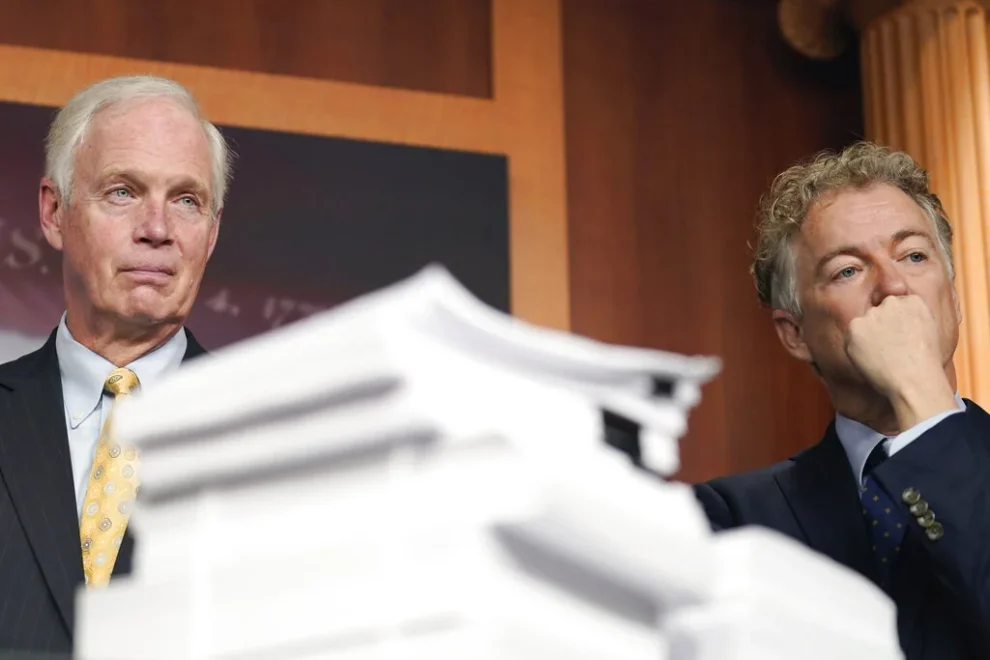Republican budget hawks faced painful calculations Wednesday as the House inched toward advancing President Donald Trump’s “big, beautiful bill” that would saddle more generations with trillions of dollars in debt.
A fresh analysis from the Congressional Budget Office projected the proposal would pile on some $3 trillion over the next decade to the national debt, which already stands at an eye-popping $36 trillion. The estimate only further crippled chances of winning over holdouts.
“It should be D-O-A. We shouldn’t even be talking about this bill,” Sen. Ron Johnson (R-WI) told the Washington Examiner. “It’s so awful. It’s so far off the mark. It’s so inadequate. I’ve been trying to interject reality. I’ve been trying to interject facts and figures.”
Johnson added: “We’re missing the forest talking about twigs and leaves.”
Sen. Rand Paul (R-KY) said Republicans and conservatives “traditionally were not for adding more debt” and slammed the bill’s inclusion of a debt ceiling hike to avoid a summertime default.
“Voting for this bill will be voting for the largest increase in the debt ceiling ever in our history,” the libertarian senator said. “You would think that would make conservatives pause.”
The nonpartisan CBO found the One Big Beautiful Bill Act would increase the deficit by $3.8 trillion from extending Trump’s 2017 tax cuts, and that higher earners stand to benefit the most. Changes to Medicaid and food stamps, among other policies, would reduce spending by $1 trillion.
Still, Republican leaders showed no signs of changing course and insisted that unaccounted economic growth would ultimately reduce the deficit. Defiant House leaders returned Wednesday from a White House meeting with Trump and were determined to muscle the megabill through the GOP’s slim majority, even as a stalemate persisted with Freedom Caucus holdouts weary of the additional debt.
Fiscal hawks saw the figures as the latest justification to oppose the measure that seeks to advance Trump’s domestic agenda on energy, the border, and taxes, even as they face mounting pressure to fall in line.
“This is staggering — the amount of deficit,” Sen. Rick Scott (R-FL) said. “We’re not going to get inflation under control. We’re not going to get interest rates down. I want to help the president get his agenda done, but I want to balance the budget.”
But for those who contend it will chip away at the deficit by tens of billions of dollars, the CBO’s analysis was the latest example of inaccurate estimates being used to kneecap months of work and negotiations.
“They are wrong often, and sometimes they’re wrong in an order of magnitude, in one case, by a trillion dollars,” House Budget Committee Chairman Jodey Arrington (R-TX) said in an early morning hearing on the bill Wednesday.
CBO projected in 2018 that Trump’s tax cuts would yield $1.5 trillion less in net revenue than the government ultimately raised from 2018 through 2024, though the discrepancy was largely attributed to inflation. CBO Director Phillip Swagel is a Republican appointee who’s served in the role since 2019, but that hasn’t prevented conservative accusations of the agency embracing a left-leaning tilt.

“We’re not going to see the deficit go up,” Arrington later told reporters. “It will go down, but it will be modest, and it will need us to do more.”
CBO’s miscalculations on Obamacare in the 2010s remain another burning reminder for Republicans of when its analysts got it wrong. Enrollment in the healthcare exchange was half what it originally expected and the Medicaid expansion was costlier. On its current projection for Trump’s bill, CBO predicts 8.6 million people will lose health insurance coverage from changes to Medicaid and Obamacare, formally named the Affordable Care Act. The numbers offer another point of contention for Republicans concerned about their lower-income constituents losing coverage.
In addition to instances of CBO missing the mark on its projections, Republican supporters say naysayers on Trump’s bill aren’t factoring in economic growth and a controversial move by Senate GOP leaders to rely on a so-called “current policy baseline” that critics say simply masks debt. By assuming expiring tax cuts worth $4 trillion from Trump’s first term would be extended or made permanent, Republicans score the legislation as though it does not increase the deficit, a tactic that fiscal hawks, budget watchdogs, and even House supporters of the megabill consider a “gimmick.”
“I keep hearing this, that there’s a deficit in the bill. So, yeah, I am concerned,” said Sen. Mike Crapo (R-ID), saying CBO was inaccurate. “We have a current policy baseline. So, I don’t agree that refusing to raise taxes creates a deficit.”
The House is scrambling to overcome a logjam with fiscal hawks in the Freedom Caucus. And across the Capitol, Republican senators weary of claims the deficit won’t be worsened are being heavily lobbied as the next hurdle to overcome once the legislation clears the House.
A closed-door meeting this week between GOP senators and House Speaker Mike Johnson (R-LA) did little to move the needle, with Republicans in the upper chamber eager to put their own spin on the bill. Sen. Ron Johnson has dug in on his pitch for senators to reject the megabill and chop it into smaller versions that meet pre-pandemic spending levels.
“I voted for President Trump to defeat the deep state. You don’t defeat the deep state by funding it at Biden’s levels,” Sen. Ron Johnson said. “That’s basically what [Speaker Johnson] is proposing that we do.”
MIKE JOHNSON BRINGS IN TRUMP FOR FINAL PUSH ON ‘BIG, BEAUTIFUL BILL’
Sen. Ron Johnson was “not in the slightest” worried he could be the target of Trump’s ire for bucking the president’s calls for unity. Rep. Thomas Massie (R-KY), whose opposition is based on similar deficit concerns, has been targeted by Trump as a “grandstander” who fails to understand government.
“I’ve got the facts, I’ve got the figures on my side,” Sen. Johnson added.
Marisa Schultz contributed to this report.
























